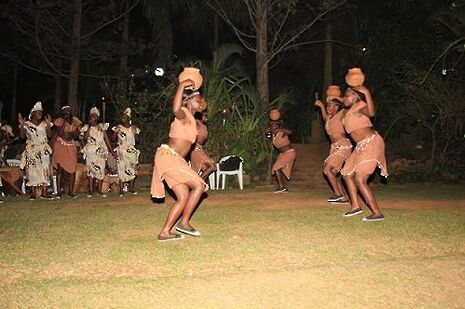Fighting child marriage in Uganda
As the Ugandan people start to speak up about the lack of democracy in their homeland, Haxie Meyers-Belkin looks at how the ongoing tradition of child marriages poses as a barrier to the country’s long-term development.

Small wooden signs litter the red-dust road out of Kampala advertising the vast array of non-government schools the Ugandan capital has to offer. Stories of absent teachers and non-existent resources in state establishments have prompted even the poorest families to go private.
“Going to school has made me feel like I'm on the right path to making a better future for myself,” Amanda Katoola tells me, a bright girl with an infectious laugh and a soft spot for French and Drama.
Statistically speaking, she is a rarity. Amanda and her classmates make up the pitifully small 16% of Ugandan girls of secondary school age currently in education.
Whilst it is undoubtedly true that educating boys rather than girls is still considered to be a better investment financially, there is one factor that increasingly cannot be ignored. A staggering 50% of Ugandan girls between the ages of 14 and 19 are officially registered as married in contrast to a mere 15% of boys of the same age.
I am told the story of Grace Namatov, now a 22 year-old woman, who was forced out of school and into marriage upon her parents’ separation. She became her new husband’s third wife, joining the ranks of the 28% of Ugandan women in polygamous relationships. Despite her dreams of becoming a dancer, which could have meant securing economic freedom for her and her children, Grace’s community forced her to shun O-Levels in exchange for marriage.
When women and children find themselves alone in this way, child marriage is often seen as a practical solution for both securing the child’s future and alleviating the financial burden of a young girl on a household.
Yet this packaging of child unions as a social necessity ultimately amounts to the sanctioning of what the recent IPPF Ending Child Marriage policy guide has claimed to be “one of the most persistent forms of sanctioned sexual and economic abuse of young girls and women” in the world. Not to mention the isolation, fear and maltreatment experienced by girls denied that vital transitory period between childhood and womanhood.
One man determined to wipe out the practice of early marriage is Frank Katoola, Amanda’s father. He is Director and Co-Founder of Tender Talents, an inspirational school in the outskirts of Kampala dedicated to giving students the education and life skills so desperately needed to break the cycle of poverty and despair that allows the institution of early marriage to flourish.
Katoola is keen to explain to me that his emphasis on education for girls, a right to which only unmarried girls have access, stems from his belief that the 68% illiteracy rate amongst women –compared to 32% for men – is “among the main obstacles that prevent women from actively improving their life situation and participating in the development of their communities”.

With the empowering potential of the arts at the heart of the school’s ethos, Katoola’s students often take their infectious passion for drama, dance and social change into more rural communities.
“Our performances focus on issues that are relevant for these people: women’s rights, domestic abuse and child marriage,” he explains. Such grassroots initiatives play a vital role in creating the crucial dialogue between people who until recently have been excluded from the issues at hand: the men, boys and village elders who are instrumental in reshaping attitudes.
“Men are often as ignorant as the girls, but are starting to understand how women’s empowerment forms an integral part of Uganda’s general development.”
Simply put, a girl who studies is less likely to have children when she herself is still a child. She is more likely to be literate, healthy, and survive into adulthood, as are her children.
“Education is a long process, but it’s the only way,” says Katoola, who, having saved his twelve-year-old niece from the inevitable abuse of an early marriage, is all too well placed to understand the long-term nature of his aspirations.
Money, as ever, is a huge issue. And when a significant bride price is offered to a family, and the prospect of ever-increasing school fees looms, how can they resist?
Communities must be armed with the knowledge that such brutal disempowerment of women and girls can only serve to lessen the integrity and socioeconomic progress of the collective whole.
The international community must come together, with aid from Western governments, to implement a programme of education that works closely with communities to establish links of information and support.
Uganda is acutely aware of the need for cultural and economic progress. Its citizens are currently staging bi-weekly Walk to Work protests in opposition to President Museveni’s undemocratic attempts to cling on to power. So there is no better time for Uganda to realise that, in Amanda Katoola’s words, “knowledge is power”.
 News / Report suggests Cambridge the hardest place to get a first in the country23 January 2026
News / Report suggests Cambridge the hardest place to get a first in the country23 January 2026 Arts / Exploring Cambridge’s modernist architecture20 January 2026
Arts / Exploring Cambridge’s modernist architecture20 January 2026 Comment / The (Dys)functions of student politics at Cambridge19 January 2026
Comment / The (Dys)functions of student politics at Cambridge19 January 2026 Theatre / The ETG’s Comedy of Errors is flawless21 January 2026
Theatre / The ETG’s Comedy of Errors is flawless21 January 2026 News / Write for Varsity this Lent16 January 2026
News / Write for Varsity this Lent16 January 2026










